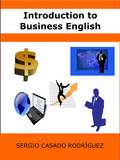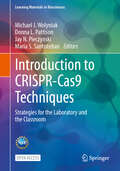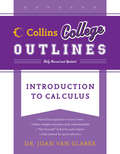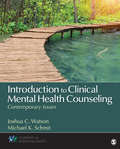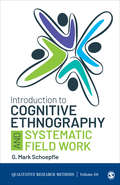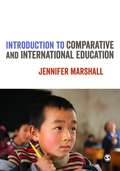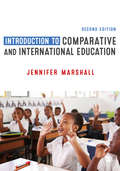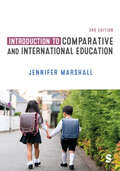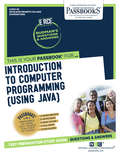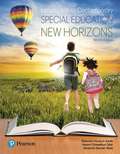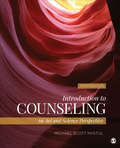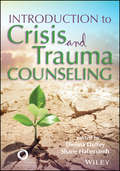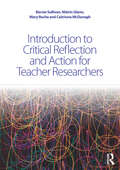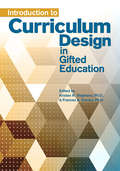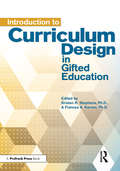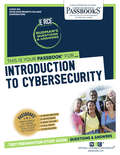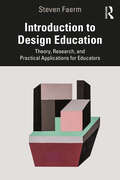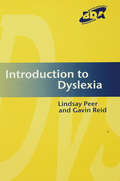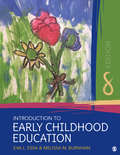- Table View
- List View
Introduction to Business English (Words and Their Secrets)
by Sergio Casado RodríguezAn ebook designed for those who are interested in perfecting their English, and introducing some of the essential variants, such as English used for business or Business English.
Introduction to CRISPR-Cas9 Techniques: Strategies for the Laboratory and the Classroom (Learning Materials in Biosciences)
by Michael J. Wolyniak Donna L. Pattison Jay N. Pieczynski Maria S. SantistebanThis open-access textbook provides an in-depth introduction into the CRISPR-cas9 technology and explores its use across the gamut of biological model systems. As the subject has risen from a significant new discovery to a mainstream molecular biology practice, it is essential that students of molecular biology understand the fundamentals behind CRISPR-Cas9 technology and how it may be employed efficiently and ethically in research. This volume, edited by experts in both, molecular biology and undergraduate education, will teach not only the fundamentals of using CRISPR-Cas9, but also how to successfully employ this technology in classroom settings. The book is written for undergraduates and advanced high school classes in the area of molecular biology, genetics, genomics and biological engineering and will provide a perfect tool for undergraduate lecturers to prepare their classes.
Introduction to Calculus
by Joan Van GlabekMaster Your Coursework with Collins College Outlines The Collins College Outline for Introduion to Calculus tackles such topics as funions, limits, continuity, derivatives and their applications, and integrals and their applications. This guide is an indispensable aid to helping make the complex theories of calculus understandable. Completely revised and updated by Dr. Joan Van Glabek, this book includes a test yourself seion with answers and complete explanations at the end of each chapter. Also included are bibliographies for further reading, as well as numerous graphs, charts, illustrations, and examples. The Collins College Outlines are a completely revised, in-depth series of study guides for all areas of study, including the Humanities, Social Sciences, Mathematics, Science, Language, History, and Business. Featuring the most up-to-date information, each book is written by a seasoned professor in the field and focuses on a simplified and general overview of the subje for college students and, where appropriate, Advanced Placement students. Each Collins College Outline is fully integrated with the major curriculum for its subje and is a perfe supplement for any standard textbook.
Introduction to Catholicism: A Complete Course (2nd Edition)
by James SociasIntroduction to Catholicism, 2nd Edition, contains the same Catholic teaching found in the popular original textbook, with expanded topics. Based on the Catechism of the Catholic Church, this text covers the basic tenets of the Faith and what it means to be Catholic; to include an additional 200+ pages, a new design layout, and additional pieces of full-color liturgical art. Topics include: The Holy Catholic Church The Blessed Trinity The Paschal Mystery The Blessed Virgin Mary The Sacraments and Prayer Christian Morality and the Universal Call to Holiness New chapter on Social Doctrine This textbook is published with ecclesiastical approval from the Archdiocese of Chicago.
Introduction to Clinical Mental Health Counseling: Contemporary Issues (Counseling and Professional Identity)
by Michael K. Schmit Joshua WatsonIntroduction to Clinical Mental Health Counseling presents a broad overview of the field of clinical mental health and provides students with the knowledge and skills to successfully put theory into practice in real-world settings. Drawing from their experience as clinicians, authors Joshua C. Watson and Michael K. Schmit cover the foundations of clinical mental health counseling along with current issues, trends, and population-specific considerations. The text introduces students to emerging paradigms in the field such as mindfulness, behavioral medicine, neuroscience, recovery-oriented care, provider care, person-centered treatment planning, and holistic wellness, while emphasizing the importance of selecting evidence-based practices appropriate for specific clients, issues, and settings. Aligned with 2016 CACREP Standards and offering practical activities and case examples, the text will prepare future counselors for the realities of clinical practice.
Introduction to Clinical Mental Health Counseling: Contemporary Issues (Counseling and Professional Identity)
by Michael K. Schmit Joshua WatsonIntroduction to Clinical Mental Health Counseling presents a broad overview of the field of clinical mental health and provides students with the knowledge and skills to successfully put theory into practice in real-world settings. Drawing from their experience as clinicians, authors Joshua C. Watson and Michael K. Schmit cover the foundations of clinical mental health counseling along with current issues, trends, and population-specific considerations. The text introduces students to emerging paradigms in the field such as mindfulness, behavioral medicine, neuroscience, recovery-oriented care, provider care, person-centered treatment planning, and holistic wellness, while emphasizing the importance of selecting evidence-based practices appropriate for specific clients, issues, and settings. Aligned with 2016 CACREP Standards and offering practical activities and case examples, the text will prepare future counselors for the realities of clinical practice.
Introduction to Cognitive Ethnography and Systematic Field Work (Qualitative Research Methods)
by G. Mark SchoepfleIntroduction to Cognitive Ethnography and Systematic Field Work by G. Mark Schoepfle provides a guide to the fundamentals of cognitive ethnography for qualitative research. A focus of this technique is collecting data from flexible but rigorous interviews. These interviews are flexible because they are designed to be structured around the semantic knowledge being elicited from the speaker, not around some pre-conceived design that is based on the researcher’s background, and they are rigorous because the basic linguistic and semantic structures are shared among all cultures. Written by one of the founders of this technique, this text provides a wealth of concentrated knowledge developed over years to best suit this collaborative and participant-centric research process. Eight chapters show how intertwined data collection and analysis are in this method. The first chapter offers a brief history and overview of the cognitive ethnography. Chapter 2 covers planning a research project, from developing a research question to ethics and IRB requirements. The next two chapters cover interview background, techniques, and structures. Chapter 5 addresses analysis while Chapter 6 covers transcription and translation. Chapter 7 covers observation, while a final chapter address writing a report for both consultants and outside audiences.
Introduction to Cognitive Ethnography and Systematic Field Work (Qualitative Research Methods)
by G. Mark SchoepfleIntroduction to Cognitive Ethnography and Systematic Field Work by G. Mark Schoepfle provides a guide to the fundamentals of cognitive ethnography for qualitative research. A focus of this technique is collecting data from flexible but rigorous interviews. These interviews are flexible because they are designed to be structured around the semantic knowledge being elicited from the speaker, not around some pre-conceived design that is based on the researcher’s background, and they are rigorous because the basic linguistic and semantic structures are shared among all cultures. Written by one of the founders of this technique, this text provides a wealth of concentrated knowledge developed over years to best suit this collaborative and participant-centric research process. Eight chapters show how intertwined data collection and analysis are in this method. The first chapter offers a brief history and overview of the cognitive ethnography. Chapter 2 covers planning a research project, from developing a research question to ethics and IRB requirements. The next two chapters cover interview background, techniques, and structures. Chapter 5 addresses analysis while Chapter 6 covers transcription and translation. Chapter 7 covers observation, while a final chapter address writing a report for both consultants and outside audiences.
Introduction to Comparative and International Education
by Jennifer MarshallComparative and international education is an increasingly important area of study. This book introduces major themes surrounding globalisation and education, giving you a nuanced understanding of key debates, thinkers and sources of information. Important theories and research exploring how globalisation has influenced educational practice are critically examined, providing you with an understanding of relevant social, economic, historical and cultural factors. Coverage includes: Case studies from around the world raising thought-provoking questions on chapter topics How to undertake research using significant secondary sources of comparative international data (including OECD, PISA, TIMMS) The relationship between development, education and inequality The purpose and role of multicultural and citizenship education Gender and education in a global context This is essential reading for students on undergraduate Education Studies degrees, and for similar courses covering comparative and international education.
Introduction to Comparative and International Education
by Jennifer MarshallThis book introduces major themes surrounding comparative and international education, giving you a nuanced understanding of key debates, and thinkers, and the tools necessary to conduct comparisons using secondary sources. Social, economic, historical, and cultural factors are examined in order to investigate the varied contexts in which education takes place around the globe. Fully updated throughout, this second edition includes: A new 'Key concepts' feature explaining essential ideas and principles Additional case studies from non-Western education systems Updated statistical data highlighting educational and demographic trends This is essential reading for students on undergraduate Education Studies degrees, and for similar courses covering comparative and international education. Jennifer Marshall is Senior Lecturer in Education at the University of Derby.
Introduction to Comparative and International Education
by Jennifer MarshallThis book introduces major themes surrounding comparative and international education, giving you a nuanced understanding of key debates, and thinkers, and the tools necessary to conduct comparisons using secondary sources. Social, economic, historical, and cultural factors are examined in order to investigate the varied contexts in which education takes place around the globe. Fully updated throughout, this second edition includes: A new 'Key concepts' feature explaining essential ideas and principles Additional case studies from non-Western education systems Updated statistical data highlighting educational and demographic trends This is essential reading for students on undergraduate Education Studies degrees, and for similar courses covering comparative and international education. Jennifer Marshall is Senior Lecturer in Education at the University of Derby.
Introduction to Comparative and International Education
by Jennifer MarshallThis book introduces major themes surrounding comparative and international education, giving you a nuanced understanding of key debates, and thinkers, and the tools necessary to conduct comparisons using secondary sources. Social, economic, historical, and cultural factors are examined in order to investigate the varied contexts in which education takes place around the globe. This new edition includes: New case studies touching on contemporary issues from decolonising the curriculum to the impact of the Covid-19 pandemic on education A new introduction outlining the features of the book and how to use them Updated educational data from around the world and new links to external resources Dr Jennifer Marshall is Senior Lecturer in Education at the University of Derby.
Introduction to Comparative and International Education
by Jennifer MarshallThis book introduces major themes surrounding comparative and international education, giving you a nuanced understanding of key debates, and thinkers, and the tools necessary to conduct comparisons using secondary sources. Social, economic, historical, and cultural factors are examined in order to investigate the varied contexts in which education takes place around the globe. This new edition includes: New case studies touching on contemporary issues from decolonising the curriculum to the impact of the Covid-19 pandemic on education A new introduction outlining the features of the book and how to use them Updated educational data from around the world and new links to external resources Dr Jennifer Marshall is Senior Lecturer in Education at the University of Derby.
Introduction to Computer Programming: Passbooks Study Guide (Excelsior/Regents College Examination Series)
by National Learning CorporationThe Excelsior/Regents College Examinations (E/RCE) offer you an opportunity to obtain recognition for college-level learning and consists of exams designed to demonstrate achievement and mastery of various college-level subjects, such as the Arts and Sciences, Business, Criminal Justice, Education, Health and Nursing. The E/RCE Introduction to Computer Programming (Using Java) Passbook® prepares you by sharpening knowledge of the skills and concepts necessary to succeed on the upcoming exam and the college courses that follow. It provides a series of informational texts as well as hundreds of questions and answers in the areas that will likely be covered on your upcoming exam, including computer operations; principles of computer programming; knowledge of Java; and more.
Introduction to Contemporary Special Education: New Horizons
by Deborah Smith Naomi Tyler Kimberly SkowIntroduction to Contemporary Special Education: New Horizons presents an introduction to the professional practices, trends, and research that define contemporary special education while also conveying the diversity and excitement of this changing field.
Introduction to Counseling: An Art and Science Perspective
by Michael S. NystulIntroduction to Counseling provides an overview of counseling and the helping professions from the perspective of art and science—the science of counseling that generates a knowledge base proven to promote competency and efficacy in the practitioner, and the art of using this knowledge base to build skills that can be applied sensitively to clients in a multicultural society. The Fifth Edition has been organized into three sections: (1) an overview of counseling and the counseling process, (2) multicultural counseling and counseling theories, and (3) special approaches and settings. It continues to address key topics and issues, including gender, culture, and sexual orientation, and offers ways to integrate multiculturalism into all aspects of counseling, rather than view it as a separate entity. Highlighting emerging trends and changes in ethical codes, as well as reflecting the latest updates to the Diagnostic Statistical Manual (DSM-5), the book successfully illustrates the importance of art and science to modern-day counseling.
Introduction to Counseling: An Art and Science Perspective
by Michael S. NystulIntroduction to Counseling provides an overview of counseling and the helping professions from the perspective of art and science—the science of counseling that generates a knowledge base proven to promote competency and efficacy in the practitioner, and the art of using this knowledge base to build skills that can be applied sensitively to clients in a multicultural society. The Fifth Edition has been organized into three sections: (1) an overview of counseling and the counseling process, (2) multicultural counseling and counseling theories, and (3) special approaches and settings. It continues to address key topics and issues, including gender, culture, and sexual orientation, and offers ways to integrate multiculturalism into all aspects of counseling, rather than view it as a separate entity. Highlighting emerging trends and changes in ethical codes, as well as reflecting the latest updates to the Diagnostic Statistical Manual (DSM-5), the book successfully illustrates the importance of art and science to modern-day counseling.
Introduction to Crisis and Trauma Counseling
by Thelma Duffey Shane Haberstroh“Now more than ever, this text is needed. The authors do a wonderful job of tackling the topics most critical in counseling trauma survivors. The resilience-based perspective and the focus on prevention is refreshing and reinforces the idea that people are survivors who are able to thrive even in the darkest and most difficult of times. This book is essential reading for all counselors.” —Victoria E. Kress, PhD, Youngstown State University “This book provides an exceptional review of the contemporary sociopolitical issues, historical perspectives, and clinical skills critical to effective crisis and trauma healing. Incorporating issues of power, privilege, culture, ecological context, and relational dynamics affords a unique perspective and makes this resource a must for anyone working in the area of trauma and crisis.” —Frederic P. Bemak, EdD, Professor Emeritus, George Mason University, Founder and Director, Counselors Without Borders This introductory text integrates evidence-based models and best practices with relational-cultural theory, which is responsive to the many forms of traumatic stress and tragedies that clients experience. It is a unique contribution that emphasizes the power of the connections counselors form with clients and communities in crisis and the means by which counselors can intervene, inspire growth, and promote healing during times of tragedy and loss. Readers will gain vital skills as they learn real-life approaches to crisis work with diverse populations in a variety of settings, including individuals, families, communities, students, military personnel, violence survivors, and clients who are suicidal. The authors provide strength-based, trauma-informed applications of cognitive behavioral therapy, behavioral therapy, neurofeedback, mindfulness, and creative practices. In addition, each chapter contains compelling case examples, multiple-choice and essay questions, and key topic discussion prompts to guide student learning and promote classroom discussion. *Requests for digital versions from the ACA can be found on wiley.com. *To request print copies, please visit the ACA website here. *Reproduction requests for material from books published by ACA should be directed to permissions@counseling.org Thelma Duffey, PhD, is professor and chair in the Department of Couns
Introduction to Critical Reflection and Action for Teacher Researchers: A Step-by-step Guide
by Caitriona McDonagh Mary Roche Bernie Sullivan Máirín GlennIntroduction to Critical Reflection and Action for Teacher Researchers provides crucial direction for educators looking to improve their teaching and maximise learning. While many students can grasp the basic elements of researching their practice and can write about practitioner research, some need guidance and assistance to reflect meaningfully on their teaching practice so as to articulate their educational values. This book provides this guidance. By exploring how to engage in an authentic, practical and personalised framework, the book encourages critical reflection and action on educational practice. Moving through the process of reflecting on practice, engaging in critical thinking and planning and taking action, it helps the reader to subsequently generate educational theory from their own personal learning. Examples from the authors’ experiences illustrate the issues raised in each section, with ‘Pause and Reflect’ activities, guidelines for conducting a research project and annotated further reading available for every chapter. Introduction to Critical Reflection and Action for Teacher Researchers is based on the idea that reflection is in itself a deliberate action and something we must live - it is key to understanding our practice and is a core component of action research. This book is a valuable guide for teachers, trainee teachers and researchers interested in reflecting on and enhancing their teaching practice.
Introduction to Curriculum Design in Gifted Education
by Kristen Stephens Frances KarnesGifted students require a curriculum that intentionally aligns with their advanced abilities to ensure engagement at the appropriate level of intensity and depth. Introduction to Curriculum Design in Gifted Education offers an in-depth exploration of curriculum development for the gifted. Included are the general foundations of good curriculum design, a survey of curriculum models appropriate for gifted learners, an examination of design considerations across content areas, a detailed analysis of the role assessment has in the curriculum development process, and an exploration of trends and future directions of curriculum development for the gifted. Each chapter is authored by experts with considerable knowledge pertaining to curriculum implications for gifted students and is written with the practitioner in mind to facilitate effective implementation. This text is an essential addition to the library of any educator seeking to create new and/or adapt existing curriculum to better address the interests and abilities of gifted students.
Introduction to Curriculum Design in Gifted Education
by Kristen R. StephensGifted students require a curriculum that intentionally aligns with their advanced abilities to ensure engagement at the appropriate level of intensity and depth. Introduction to Curriculum Design in Gifted Education offers an in-depth exploration of curriculum development for the gifted. Included are the general foundations of good curriculum design, a survey of curriculum models appropriate for gifted learners, an examination of design considerations across content areas, a detailed analysis of the role assessment has in the curriculum development process, and an exploration of trends and future directions of curriculum development for the gifted. Each chapter is authored by experts with considerable knowledge pertaining to curriculum implications for gifted students and is written with the practitioner in mind to facilitate effective implementation. This text is an essential addition to the library of any educator seeking to create new and/or adapt existing curriculum to better address the interests and abilities of gifted students.
Introduction to Cybersecurity: Passbooks Study Guide (Excelsior/Regents College Examination Series)
by National Learning CorporationThe Excelsior/Regents College Examinations (E/RCE) offer you an opportunity to obtain recognition for college-level learning and consists of exams designed to demonstrate achievement and mastery of various college-level subjects, such as the Arts and Sciences, Business, Criminal Justice, Education, Health and Nursing. The E/RCE Introduction to Cybersecurity Passbook® prepares you by sharpening knowledge of the skills and concepts necessary to succeed on the upcoming exam and the college courses that follow. It provides a series of informational texts as well as hundreds of questions and answers in the areas that will likely be covered on your upcoming exam.
Introduction to Design Education: Theory, Research, and Practical Applications for Educators
by Steven FaermThis practical, engaging book offers design educators a comprehensive, hands-on introduction to design education and pedagogy in higher education. Featuring instructional strategies and case studies from diverse design disciplines, including fashion design, architecture, and industrial design, from both the US and abroad, award-winning author Steven Faerm contextualizes design pedagogy with student development—a critical component to fostering successful teaching, optimal learning, and student success in this ever-evolving industry. Features include the following: · Advanced pedagogical methods and strategies to improve design students’ learning, holistic development, and design school experience. · Insights into the changing nature of the design industries and future challenges faced by design educators within higher education, and how design programs can be strengthened to better respond to these challenges. · A range of practical, flexible teaching methods and pedagogical techniques that design educators can easily adapt into their own settings. · Diverse international case studies and interviews with thought leaders in design, design education, and higher education. Written by a leading educator in fashion design, Faerm offers educators, school leaders, and administrators the context and skills to understand the evolving nature of the design industry and design education, and to improve design students’ learning and design school experience.
Introduction to Dyslexia
by Gavin Reid Lindsay PeerThis work provides the class teacher with a straightforward introduction to dyslexia. The authors highlight methods of identification of dyslexia within the classroom context and provide examples of how dyslexia can be dealt with by the class teacher.
Introduction to Early Childhood Education
by Eva L. Essa Melissa M. BurnhamIntroduction to Early Childhood Education provides current and future educators with a highly readable, comprehensive overview of the field. The underlying philosophy of the book is that early childhood educators’ most important task is to provide a program that is sensitive to and supports the development of young children. Author Eva L. Essa and new co-author Melissa Burnham provide valuable insight by strategically dividing the book into six sections that answer the "What, Who, Why, Where, and How" of early childhood education. Utilizing both NAEYC (National Introduction to Early Childhood Education provides current and future educators with a highly readable, comprehensive overview of the field. The underlying philosophy of the book is that early childhood educators’ most important task is to provide a program that is sensitive to and supports the development of young children. Author Eva L. Essa and new co-author Melissa Burnham provide valuable insight by strategically dividing the book into six sections that answer the "What, Who, Why, Where, and How" of early childhood education. Utilizing both NAEYC (National Association for the Education of Young Children) and DAP (Developmentally Appropriate Practice) standards, this supportive text provides students with the skills, theories, and best practices needed to succeed and thrive as early childhood educators. A Complete Teaching & Learning Package SAGE Premium Video Included in the interactive eBook! SAGE Premium Video tools and resources boost comprehension and bolster analysis. Interactive eBook Your students save when you bundle the print version with the Interactive eBook (Bundle ISBN: 978-1-5443-6883-2), which includes access to SAGE Premium Video and other multimedia tools. SAGE coursepacks SAGE coursepacks makes it easy to import our quality instructor and student resource content into your school’s learning management system (LMS). Intuitive and simple to use, SAGE coursepacks allows you to customize course content to meet your students’ needs. SAGE edge This companion website offers both instructors and students a robust online environment with an impressive array of teaching and learning resources.
